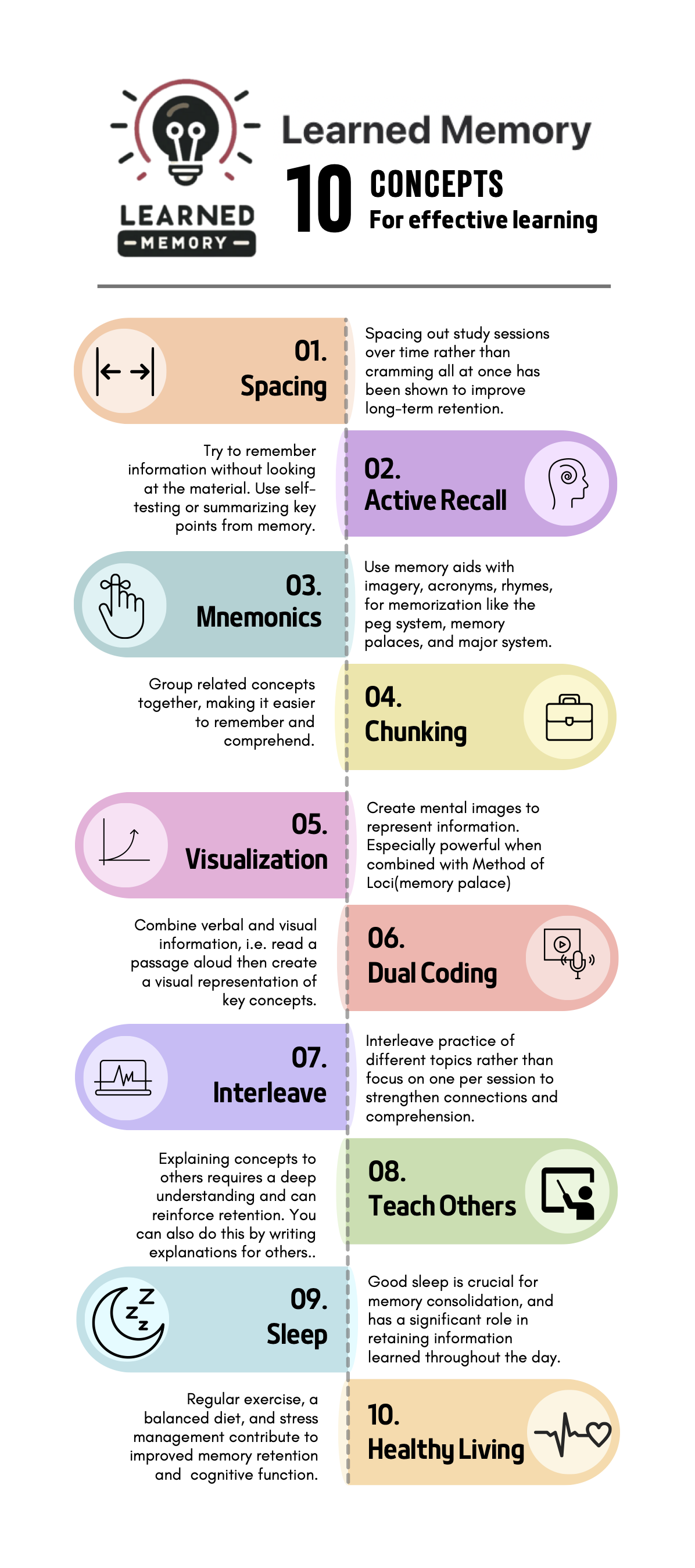Can Memory be Learned?
Studying more effectively

By Richard Anton
February 14, 2024
Updated June 2, 2024
There are a number of scientifically supported techniques for improving memory retention and comprehension that are relatively easy to understand. Some of them are fairly simple to get start with, while some take more practice.
We will dive into how to get started with some simple improvements to memory retention when studying after describing some of the concepts involved.
Here are some of the basic concepts:
- Spaced Repetition: Spacing out study sessions over time rather than cramming all at once has been shown to improve long-term retention. Encourage learners to review material at increasing intervals to reinforce memory.
- Active Recall: Instead of passively reviewing material, engage in active recall by trying to remember information without looking at the material. This could involve self-quizzing or summarizing key points from memory.
- Mnemonic Devices: Mnemonics are memory aids that use vivid imagery, acronyms, or rhymes to help recall information. Teaching learners mnemonic techniques can significantly improve their ability to remember complex information.
- Chunking: Break down large amounts of information into smaller, manageable chunks. Group related concepts together, making it easier to remember and comprehend.
- Visualization: Encourage learners to create mental images or diagrams to represent information. Visualization can aid in memory recall and understanding complex concepts.
- Dual Coding: Combine verbal and visual information when studying. For example, read a passage aloud and then create a visual representation or diagram of the key concepts.
- Interleaved Practice: Mix up different types of problems or topics during study sessions rather than focusing on one topic at a time. This helps strengthen connections between related concepts and improves overall comprehension.
- Teaching Others: The act of explaining concepts to someone else requires a deep understanding of the material and can reinforce memory retention. Encourage learners to teach what they've learned to peers or family members.
- Sleep: Adequate sleep is crucial for memory consolidation. Encourage learners to prioritize sleep, as it plays a significant role in retaining information learned throughout the day.
- Healthy Lifestyle: Regular exercise, a balanced diet, and stress management techniques can also contribute to improved memory retention and overall cognitive function.
By incorporating these techniques into learning strategies, individuals can enhance their memory retention and comprehension of material.
Where to Start?
Let’s talk about some more concrete steps to get started with some relatively simple yet effective methods. In order to make a difference quickly I would recommend starting with incorporating some lifestyle changes coupled with using a combination of self-testing, spaced repetition, and interleaved practice.
For the lifestyle changes: exercise, sleep, and limit caffeine intake based on how it affects you personally. For me that means no caffeine after about 2pm.
In terms of how to adapt your learning, I recommend using software to create quizzes that can help you track where you need improvement, and how long it has been since you studied a particular concept/question. If you prefer to keep things low-tech you can opt for physical flashcards using the Leitner system.
You should interleave topics/subjects rather than doing what is known as “massed practice” or cramming a particular topic.
Make it a Habit
Also, spaced repetition is not going to succeed without regular spaced study. I highly recommend scheduling dedicated study time in a particular place and time each day. If not daily, then scheduled on a calendar in advance at least.
You want to make your new, improved study system a habit. Habits take time to develop, usually around a month. During that time you will need to rely on your willpower, and should make it easier in anyway you can. A habit is built of four parts according to James Clear, author of Atomic Habits: cue, craving, response, and reward (Build Better Habits in 4 Simple Steps, n.d.).
Try to explicitly engineer each of these four components of the habit to help establish it. Same time, place, background music, etc. helps with the cue. You can also use habit stacking to help by chaining it onto an existing daily habit. Craving is a bit harder to connect to study for me, but having a coffee while doing the studying helps me since I love coffee. The intrinsic reward of accomplishment helps as well, and can be reinforced by marking this down somewhere tactile, like a wall calendar. Response is the actual thing you are trying to establish as habit. You want to remove all the friction you can. Remove digital and physical distractions from your workspace in advance, and have all your material, software, etc. already setup. The reward can be anything you enjoy, but preferably something healthy so you are not offsetting your good habit with a new bad habit. That can be a walk, a healthy snack, a beverage, or a break playing a video game. One strategy that works for me is checking it off on a calendar, and using some kind of point system to reward myself with some retail therapy or fun activity when I get to a certain point.
Several online software platforms are available to help with spaced repetition and interleaved practice. Here are some popular ones:
- Anki is a flashcard app that uses spaced repetition to help users memorize information more efficiently. It allows users to create their own flashcards or download pre-made decks from the community.
- Quizlet is a study tool that allows users to create flashcards, quizzes, and games to review material. It includes a spaced repetition feature called "Learn" mode, which adapts to the user's progress.
- Brainscape is a flashcard app that uses spaced repetition to optimize learning. It offers a wide range of pre-made flashcard decks on various topics, as well as the ability for users to create their own decks.
These software platforms can be valuable tools for incorporating spaced repetition and interleaved practice into your learning routine, whether you're studying languages, preparing for exams, or simply trying to remember important information more effectively.
I hope these study tips help you with your personal development or educational goals, and if you have any feedback on this article you can send it to ra@mail.learnedmemory.com.
Quick ReferenceYou can download a PDF of this quick reference sheet for the ten concepts for effective learning we covered in this article. |
References
Brown, P. C., Roediger, H. L., & McDaniel, M. A. (2014, April 14). Make It Stick. Harvard University Press.
Build better habits in 4 simple steps. (n.d.). Penguin Books Australia. https://www.penguin.com.au/articles/3300-build-better-habits-in-4-simple-steps
Clear, J. (2022, January 1). Atomic Habits. Editura Trei SRL.
Chunking (psychology). (2024, February 14). Wikipedia. https://en.wikipedia.org/wiki/Chunking_(psychology)
Leitner system. (2024, January 5). Wikipedia. https://en.wikipedia.org/wiki/Leitner_system
Spaced repetition. (2024, February 9). Wikipedia. https://en.wikipedia.org/wiki/Spaced_repetition
